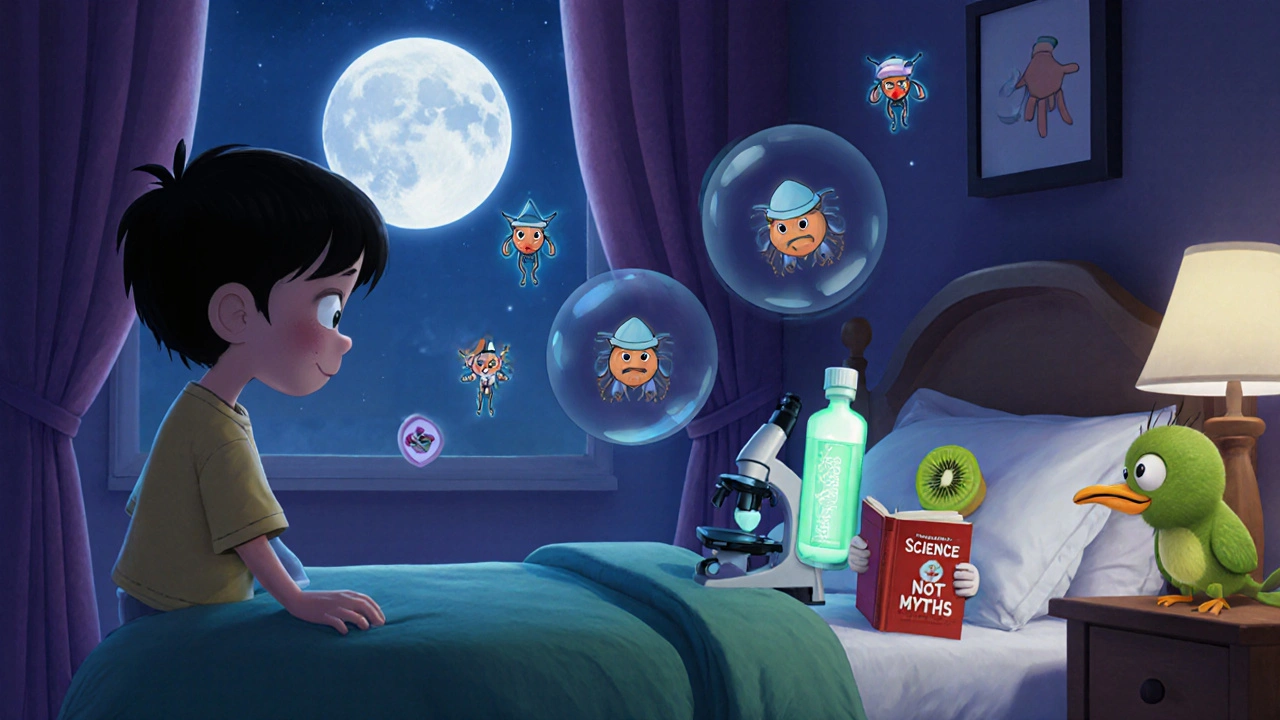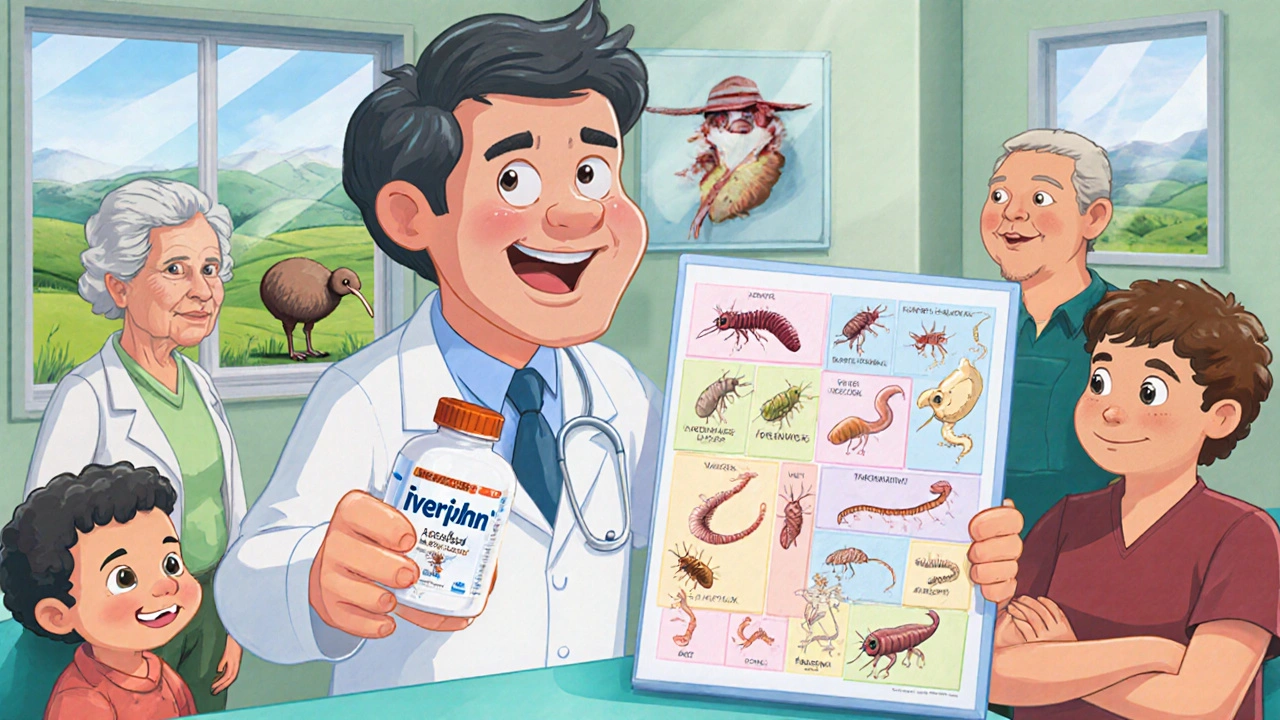Parasite Treatment Selector
Select the parasite type you're dealing with to see the recommended treatments, dosage information, and safety considerations based on New Zealand guidelines.
Recommended Treatments
Important Note
This tool provides general guidance based on New Zealand clinical guidelines. Always consult with a healthcare professional for personalized treatment recommendations. Treatment decisions depend on your specific health conditions, age, weight, and other medications.
When you’re dealing with a parasitic infection, time matters. If your doctor prescribed Iverjohn - the brand name for ivermectin - you might be wondering if there are other options that work just as well, or maybe even better. You’re not alone. Many people ask: Is ivermectin the only choice? Are there safer, cheaper, or more effective alternatives? The answer isn’t simple, but it’s practical. Let’s break down what Iverjohn does, how it stacks up against other treatments, and when you might want to pick something else.
What is Iverjohn (Ivermectin) really used for?
Ivermectin isn’t a miracle drug. It doesn’t cure every infection. It’s a specific antiparasitic that targets certain worms and parasites. In New Zealand, where Iverjohn is commonly prescribed, it’s mainly used for:
- Strongyloidiasis - a threadworm infection common in tropical regions
- Onchocerciasis (river blindness) - rare here but still treated with ivermectin
- Scabies - especially crusted or resistant cases
- Head lice - off-label use, sometimes when other treatments fail
It works by paralyzing and killing parasites. A single oral dose often clears the infection. That’s why it’s popular: simple, fast, and usually well-tolerated. But it doesn’t work on all parasites. For example, it won’t touch tapeworms, pinworms, or most protozoan infections like giardia. If your diagnosis doesn’t match these, ivermectin won’t help - no matter how much you’ve heard about it online.
How does Iverjohn compare to other antiparasitic drugs?
Not all parasites respond the same way. That’s why doctors have a toolbox of antiparasitics. Here’s how Iverjohn stacks up against the most common alternatives:
| Drug | Best For | Dosage | Common Side Effects | Availability in NZ |
|---|---|---|---|---|
| Iverjohn (Ivermectin) A broad-spectrum antiparasitic effective against nematodes and ectoparasites | Scabies, strongyloidiasis, onchocerciasis | Single oral dose (weight-based) | Nausea, dizziness, mild rash | Prescription only |
| Permethrin cream Topical treatment for scabies and head lice | Scabies (first-line), head lice | Apply to skin overnight, repeat after 7 days | Itching, burning, redness at application site | Over-the-counter |
| Albendazole Oral antihelminthic used for intestinal worms | Hookworm, roundworm, whipworm, pinworm | Single or 3-day course | Abdominal pain, headache, liver enzyme changes | Prescription only |
| Mebendazole Oral drug for common intestinal worms | Pinworm, roundworm, whipworm | Single dose, repeat in 2 weeks | Mild stomach upset | Over-the-counter |
| Metronidazole Antibiotic/antiprotozoal for giardia and trichomoniasis | Giardia, trichomoniasis | 5-7 day course | Metallic taste, nausea, dizziness | Prescription only |
Permethrin cream is often the first choice for scabies because it’s topical, avoids systemic side effects, and works fast. Iverjohn is reserved for outbreaks in nursing homes, immunocompromised patients, or when permethrin fails. For intestinal worms like pinworm, mebendazole is cheaper, easier to get, and just as effective. Albendazole is stronger and used for more stubborn cases, like tapeworms or mixed infections.
When should you avoid Iverjohn?
Ivermectin is generally safe - but not for everyone. You should not take it if:
- You’re pregnant or breastfeeding (unless benefits clearly outweigh risks - your doctor will decide)
- You have a history of severe allergic reactions to ivermectin
- You’re under 15 kg (33 lbs) - safety data is limited in very young children
- You have liver disease - ivermectin is processed by the liver
- You’re taking certain medications like warfarin, some antifungals, or seizure drugs - interactions can happen
Also, don’t use livestock-grade ivermectin. People have ended up in hospital after trying to save money by using horse dewormer. It’s not formulated for humans. The concentration is wrong. The fillers can be toxic. This isn’t a myth - it’s a documented emergency room issue in New Zealand and Australia.
What about natural or herbal alternatives?
You’ll find plenty of claims online: garlic, neem, wormwood, black walnut. Some of these have been studied in labs. But here’s the reality: none are proven to reliably treat parasitic infections in humans at safe doses. A 2023 review in the New Zealand Journal of Tropical Medicine looked at 12 herbal remedies touted for scabies or worms. Only two showed any measurable effect - and even then, they were less effective than standard treatments and caused more skin irritation.
Herbal options might help support your immune system, but they shouldn’t replace medical treatment. Delaying proper care for scabies or strongyloidiasis can lead to chronic infection, secondary skin infections, or even spread to others in your household. In rural communities in Otago and Southland, we’ve seen cases where delayed treatment turned a simple case of scabies into a months-long ordeal.
What do doctors in New Zealand actually recommend?
In Dunedin, Christchurch, and Auckland clinics, the protocol is clear: match the drug to the parasite. For scabies, permethrin first. If it fails, then ivermectin. For pinworm, mebendazole. For giardia, metronidazole. For strongyloidiasis, ivermectin is still the gold standard.
Doctors here don’t use ivermectin for COVID-19, viral infections, or as a general "detox." That’s not evidence-based. The World Health Organization and the New Zealand Ministry of Health both warn against off-label use. Ivermectin’s power lies in its precision - not its popularity.

What if Iverjohn didn’t work?
If you took Iverjohn and still have symptoms, don’t just take another dose. That’s a common mistake. Resistance is rare, but not impossible. More often, the problem is:
- Wrong diagnosis - you might have eczema, not scabies
- Reinfestation - you didn’t wash bedding or treat close contacts
- Incorrect dosing - too low for your weight
- Drug interaction - you took it with something that blocked absorption
If treatment fails, your doctor will likely:
- Confirm the diagnosis with a skin scraping or stool test
- Check your weight to recalculate the dose
- Look for other infections (like fungal or bacterial)
- Switch to a different class of drug - like albendazole or topical ivermectin cream
Don’t self-treat. A misdiagnosed case can cost you weeks - or worse.
Final thoughts: Choosing the right treatment
Iverjohn is a powerful tool - but only for the right job. It’s not better than everything else. It’s not worse. It’s just different. The best treatment depends on:
- What parasite you have
- Your age and weight
- Whether you’re pregnant or on other meds
- What’s available and affordable
For most people, the answer isn’t "Is ivermectin the best?" It’s "What’s the best for me?"
Always start with a confirmed diagnosis. Don’t rely on internet advice. If you’re unsure, ask your GP or pharmacist. They’ve seen this before - and they know what works in real life, not just in theory.
Can I buy Iverjohn over the counter in New Zealand?
No. Iverjohn (ivermectin) is a prescription-only medicine in New Zealand. You cannot buy it from pharmacies without a doctor’s prescription. This is to prevent misuse, incorrect dosing, and dangerous interactions. Even if you see it sold online as "supplements," those products are not regulated and may be unsafe.
Is Ivermectin safe for children?
Yes, but only under medical supervision. Ivermectin is approved for children over 15 kg (about 33 lbs) for scabies and strongyloidiasis. Dosing is based on weight, not age. For children under this weight, alternatives like permethrin cream are preferred. Never give adult doses to kids - even if you think they’re "big for their age."
How long does it take for Iverjohn to work?
Symptoms like itching from scabies may take days to weeks to improve, even after the parasites are dead. That’s because your skin is still reacting to dead mites and their waste. For intestinal worms, you may notice relief within 24-48 hours. But the drug kills parasites quickly - the lingering symptoms are your body healing, not the infection still active.
Can I use Iverjohn for head lice if other treatments failed?
Yes, but it’s not first-line. Doctors in New Zealand usually try permethrin, pyrethrin, or malathion first. Ivermectin is only used if those fail or if the person can’t tolerate topical treatments. It’s taken orally and requires a prescription. It’s effective, but not without risks - so it’s saved for tough cases.
Are there any natural remedies that actually work against parasites?
No proven natural remedies replace prescription antiparasitics. Some herbs like neem or wormwood show activity in lab studies, but no clinical trials prove they cure infections in humans safely. Using them instead of proven drugs can lead to worsening infection, spread to others, or complications. Stick with science-backed treatments - they’ve been tested on thousands of people.
What should I do if I accidentally took too much Iverjohn?
Call Healthline at 0800 611 116 or go to your nearest emergency department immediately. Overdose symptoms include severe dizziness, confusion, vomiting, seizures, or loss of coordination. Don’t wait. Ivermectin toxicity is rare but serious. Bring the medicine bottle with you so doctors know the exact dose you took.


13 Comments
Rebecca Parkos
Ivermectin isn't a miracle drug, but I've seen it save lives in rural clinics where access to healthcare is a joke. My cousin in Guatemala had crusted scabies for over a year-doctors there didn't even have permethrin. Ivermectin was the only thing that worked. Don't let fancy charts fool you-sometimes the simplest solution is the most human one.
Emily Barfield
So… let me get this straight-you’re telling me we’ve got a drug that can kill parasites with one pill, but we’re still pushing topical creams because… safety? Convenience? Or because Big Pharma doesn’t want us to know how cheap and effective this is? I mean, why does permethrin cost $40 when ivermectin is pennies per dose? And why are we pretending this isn’t about profit, not science? I’m not anti-medical-I’m pro-truth.
Sai Ahmed
They say don’t use horse dewormer. But how do they know what’s really in the pills they sell? Who’s testing it? The FDA? The WHO? They’ve lied before. Remember the opioid crisis? Now they’re pushing ivermectin as safe? Funny how the same people who told us hydroxychloroquine was dangerous now say ivermectin is fine. Coincidence? I think not.
Ted Carr
So the ‘gold standard’ is a drug that can’t touch pinworms but costs 10x more than mebendazole? Brilliant. I guess we just pay more to feel like we’re getting the VIP treatment. Next they’ll charge extra for the pill being the right shade of blue.
Robin Annison
I appreciate the clarity here. It’s rare to see a medical post that doesn’t oversimplify or overhype. I’ve had strongyloidiasis twice-once in Thailand, once back home. Ivermectin worked both times. But what stuck with me wasn’t the drug-it was the follow-up. The doctor didn’t just hand me a prescription. He asked about my living conditions, my family, my water source. That’s the real treatment: context. Medicine isn’t just pills. It’s people.
Bradley Mulliner
Anyone who takes ivermectin without a prescription is a walking public health hazard. You think you’re being ‘independent’? You’re just another data point in the ER’s ‘idiots who didn’t listen’ folder. And don’t get me started on the herbal ‘cures’-if garlic cured scabies, we wouldn’t need hospitals. We’d need better kitchens.
Rahul hossain
Let us not forget the quiet tragedy of the rural poor-where the pharmacy is 80 kilometers away, and the doctor visits once a month. In such places, ivermectin is not a luxury-it is a lifeline. To dismiss it because ‘permethrin is first-line’ is to speak from a bubble of privilege. The world does not run on clinical guidelines-it runs on survival.
Reginald Maarten
Correction: Ivermectin is not approved for head lice in the U.S. or New Zealand. It is used off-label, which is not the same as approved. The post correctly states this, but many commenters misunderstand the distinction. Also, mebendazole is not available OTC in all states-regulations vary. And no, livestock ivermectin is not ‘just concentrated’-it contains solvents and carriers toxic to humans. This is not a myth-it’s pharmacology 101.
Jonathan Debo
Let’s be brutally honest: the entire medical-industrial complex thrives on complexity. Why? Because simplicity doesn’t generate revenue. A single pill? Too easy. A cream you apply twice? Better. A three-day course? Even better. Ivermectin disrupts the profit model. That’s why it’s vilified when used outside the narrow corridors of institutional approval. The science is clear-but the system isn’t.
Nishigandha Kanurkar
They say don’t use horse dewormer-but what if the government is lying about what’s in the ‘prescription’ version? What if the real poison is the control? Who decides what’s ‘safe’? Who profits when you’re sick? I’ve seen people die because they couldn’t get the ‘right’ drug. Meanwhile, the same pills they ban here are sold in Mexico for $2. Coincidence? Or conspiracy?
Lori Johnson
My niece got scabies last year. We tried permethrin. It burned like hell. We tried ivermectin. It worked in one dose. We didn’t even need to wash everything-just the sheets. Honestly? I’m just glad it worked. I don’t care about the ‘protocol.’ I care that my kid stopped scratching at 3 a.m.
Tatiana Mathis
What’s missing from this entire discussion is the cultural lens. In some communities, trust in Western medicine is low-not because people are irrational, but because they’ve been failed by it. I’ve worked with Indigenous families in the Pacific Northwest who’ve seen their children misdiagnosed, overmedicated, or ignored. For them, ivermectin isn’t just a drug-it’s a symbol of autonomy. They don’t trust the system, so they find alternatives. Some are dangerous. Some are just desperate. We need to stop judging and start listening. Healing isn’t just about the pill-it’s about the relationship. And if we keep treating patients like problems to be solved instead of people to be heard, we’ll keep losing the war against preventable disease.
Albert Schueller
They say ivermectin doesn't work for COVID. But what if they're wrong? What if the studies were buried? Who funded them? Who benefits from keeping people sick? The answer is in the money. Look at the patents. Look at the stock prices. Look at the pharmaceutical lobbyists. This isn't medicine-it's a business. And ivermectin? It's the one drug they can't control. That's why they hate it.